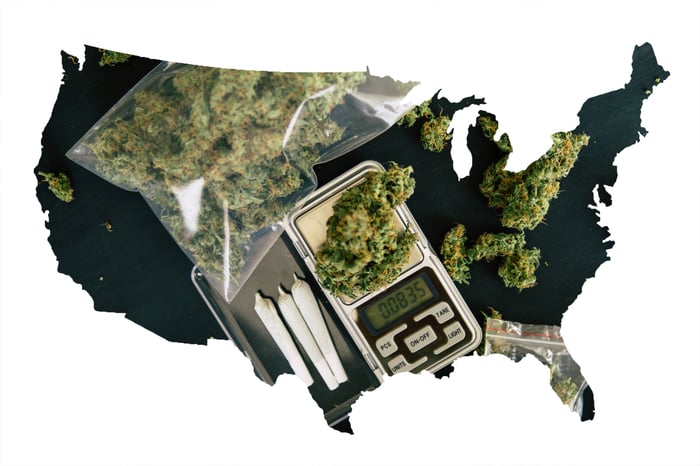Marijuana is one of the fastest growing industries on the planet. Legal weed sales have more than tripled between 2014 and 2018, and they’re on track to roughly quadruple between the $10.9 billion generated in licensed cannabis stores 2018 and the projected $40.6 billion in worldwide licensed store sales by 2024. That’s according to the 2019 “State of the Legal Cannabis Markets” report released earlier this year by Arcview Market Research and BDS Analytics.
Yet, what you might find intriguing about this rapid growth is that it’ll wind up being attributed to just a select few countries. Even though more than three dozen countries around the world have legalized medical marijuana, five countries are forecast by Arcview and BDS to account for $38.2 billion of this aforementioned $40.6 billion in licensed-store sales by 2024. Note, licensed-store sales doesn’t include general retailers selling cannabidiol (CBD) products, or cannabinoid-based drug developers selling pot-derived pharmaceuticals.

1. United States: $30.1 billion in cannabis spending by 2024
As should be no surprise, the U.S. projects as the leading marijuana market in the world by sales in 2024. In fact, the $30.1 billion in licensed-store revenue should comprise almost three-quarters of global licensed sales. According to Arcview and BDS, $9 billion of these sales are expected to come from the medical side of the equation, up from $4 billion in 2018, with the remaining $21.1 billion derived from recreational marijuana, up from $5.9 billion last year.
The thing about the U.S. is that cannabis stocks can still thrive even if the federal government doesn’t change its classification of marijuana from Schedule I. As long as Congress and the president continue to respect the right of states to make their own choices on cannabis, the industry could have plenty of runway.
One of the fastest early stage growers looks to be multistate dispensary operator Cresco Labs (CRLBF -0.80%). Cresco, which holds the licenses to more than four dozen retail locations in 11 states, made a bold move in April when it announced an all-stock deal to acquire Origin House (ORHOF). Origin House is one of only a few companies to hold a cannabis distribution license in California, the state responsible for a quarter of all U.S. marijuana spending by 2024. Thus, Cresco Labs’ purchase of Origin House will give it access to more than 500 Californian dispensaries, and over 700 nationwide. Cresco and its vertically integrated peers appear well-positioned to take advantage of this huge growth opportunity.

2. Canada: $5.18 billion by 2024
Despite being the first industrialized country in the world to legalize recreational weed, Canada looks to take a distant second to the United States by 2024 in terms of sales. Arcview and BDS are projecting that $4.8 billion in sales will come from the recreational market by then, with the remainder made up of medical cannabis sales. It’s not uncommon for the medical industry to get cannibalized when adult-use marijuana is legalized, because it means patients no longer have to wait for a doctor’s approval and prescription to buy weed.
There’s a lot of competition in Canada right now, so it’s still unclear which company will be Canada’s kingpin. However, Aurora Cannabis (ACB 14.75%) is a relatively good bet to be near the top of the pack solely based on its production potential. Aurora is already leaps and bounds ahead of its next-closest competitors with an annual run-rate output of 150,000 kilos as of the end of March, and plans to be producing at least 625,000 kilos on a run-rate basis by the end of June 2020. With most of this production located in Canada, and the company sporting a number of large-scale grow farms, Aurora Cannabis should be able to take advantage of economies of scale to drive down its growing costs per gram.
Of course, the real near-term excitement revolves around the upcoming launch of derivative products (e.g,, edibles, vapes, topicals, concentrates, and infused beverages) by mid-December. Derivatives have much better margins and pricing power than dried cannabis flower, which is why Aurora Cannabis and its peers have been busy beefing up their product offerings over the past year in preparation for this upcoming launch date.

3. Germany: $1.35 billion by 2024
Even though Arcview and BDS are not expecting Germany to legalize recreational cannabis, the company’s highly permissive stance toward medical marijuana, and the fact that health insurers cover medical weed in the country, should allow sales to soar from $79 million in 2018 to $1.35 billion by 2024.
Interestingly enough, Canadian cannabis stocks were actually big-time winners of the German cultivation licensing process. Both Aurora Cannabis and Aphria (APHA) were awarded licenses to grow cannabis in Germany. For its part, Aphria plans to have an 8,000-square-meter facility in Germany that’ll begin supplying the country with medical marijuana in the early part of 2020. In addition to growing cannabis, Aphria introduced CannRelief in Germany, which is a CBD-based nutraceutical and cosmetics product line.
As for Aurora Cannabis, its approval to construct a growing facility will allow the company to supply the German market with 4,000 kilos of marijuana over four years, with shipments expected to commence October 2020. Of course, this production capacity is liable to be bumped up if patient demand merits it.

4. Mexico: $1.02 billion by 2024
Arguably one of the oddest “legality” situations concerning marijuana right now is with Mexico. The nation’s Supreme Court has ruled five times since 2015 that imposing a ban on recreational cannabis is unconstitutional. That’s important, because when Mexico’s Supreme Court reaches five similar decisions on an issue, it becomes the standard throughout the country. Or, in layman’s terms, the Supreme Court has essentially affirmed the legality of recreational marijuana and is simply waiting for lawmakers in the country to hash out the details.
According to Arcview and BDS, Mexico will have legalized adult-use cannabis by 2024, although the ramp-up of legal sales could be slow. By 2024, recreational weed sales are only expected total $582 million, with an additional $441 million in medical spending, for a combined $1.02 billion. Mexico’s considerably larger population than Canada makes for an attractive market opportunity, but it’s unclear how well legal industries will fare with the noted presence of illicit producers.
One company that hasn’t been shy about its push into Mexico is Medical Marijuana, Inc. (MJNA -11.47%), the very first publicly listed pot stock. Southern California-based Medical Marijuana was the first company to import CBD-rich oils into Mexico in 2016, giving it a head start on building important relationships with the country’s medical community. You’ll note that even with recreational legalization likely on the horizon, medical spending should continue to grow in Mexico. That gives Medical Marijuana and its RSHO-X hemp oil a real shot to continue penetrating the Mexico’s medical cannabis market.

5. United Kingdom: $546.9 million by 2024
Although it may not be on track to tip the scales at $1 billion in sales by 2024, the U.K. is poised to be one of the fastest growing countries in the world based on cannabis spending. After only $9.9 million in medical spending last year, Britain is forecast for almost $547 million in medical marijuana revenue by 2024, representing a compound annual growth rate of 95.2%.
This sudden push to legalize and normalize medical pot use in the U.K. can be partially attributed to the success of GW Pharmaceuticals (GWPH), the cannabinoid-based drug developer that had the U.S. Food and Drug Administration approve the very first cannabis-derived drug last year. GW Pharmaceuticals’ CBD-based oral solution known as Epidiolex dazzled in late-stage studies and wound up reducing seizure frequency for patients with two rare forms of childhood-onset epilepsy by 30% to 40%. Additionally, GW Pharmaceuticals’ Sativex, an oromucosal spray containing both CBD and tetrahydrocannabinol (THC), is approved in more than a dozen markets in Europe (but not the U.S.).
Britain’s citizens and its government have seen what the U.K.-based GW Pharmaceuticals can do with cannabinoids, and its government has been open to the possibility of expanding access to marijuana-based products for medical patients.



